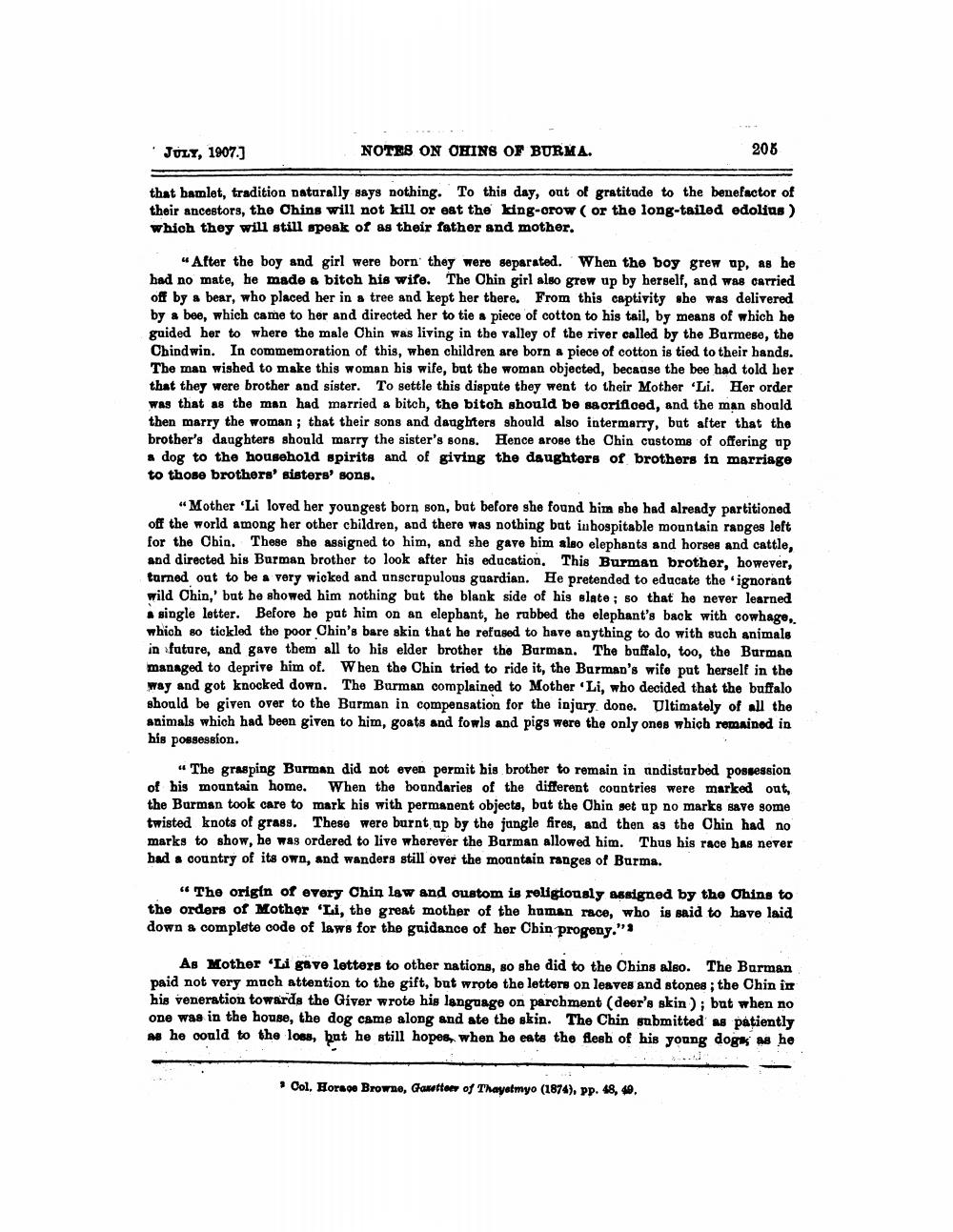________________
JULY, 1907.)
NOTES ON OHINS OF BURMA.
208
that hamlet, tradition naturally says nothing. To this day, out of gratitude to the benefactor of their ancestors, the Ohins will not kill or eat the king-orow (or the long-tailed edolius) which they will still speak of as their father and mother.
After the boy and girl were born they were separated. When the boy grew up, as he had no mate, he made a bitoh his wife. The Ohin girl also grew up by herself, and was carried off by a bear, who placed her in a tree and kept her there. From this captivity she was delivered by a bee, which came to her and directed her to tie a piece of cotton to his tail, by means of which he guided her to where the male Chin was living in the valley of the river called by the Burmese, the Chindwin. In commemoration of this, when children are born a piece of cotton is tied to their hands. The man wished to make this woman his wife, but the woman objected, because the bee had told ber that they were brother and sister. To settle this dispute they went to their Mother 'Li. Her order was that as the man had married a bitch, the bitch should be sa oriflood, and the man should then marry the woman ; that their sons and daughters should also intermarry, but after that the brother's daughters should marry the sister's sons. Hence aroge the Chin customs of offering up a dog to the household spirits and of giving the daughters of brothers in marriage to those brothers' sisters' sons.
"Mother 'Li loved her youngest born son, but before she found him she had already partitioned off the world among her other children, and there was nothing but in hospitable mountain ranges left for the Obin. These she assigned to him, and she gave him also elephants and horses and cattle, and directed his Burman brother to look after his education. This Burman brother, however, turned out to be a very wicked and unscrupulous guardian. He pretended to educate the ignorant wild Chin,' but he showed him nothing but the blank side of his slate; so that he never learned a single letter. Before he put him on an elephant, he rubbed the elephant's back with cowhage, which so tickled the poor Chin's bare skin that he refused to have anything to do with such animals in future, and gave them all to his elder brother the Burman. The buffalo, too, the Burman managed to deprive him of. When the Chin tried to ride it, the Barman's wife put herself in the way and got knocked down. The Burman complained to Mother 'Li, who decided that the buffalo should be given over to the Burman in compensation for the injury done. Ultimately of all the animals which had been given to him, goats and fowls and pigs were the only ones which remained in his possession.
· The grasping Burman did not even permit his brother to remain in andisturbed possession of his mountain home. When the boundaries of the different countries were marked out, the Burman took care to mark his with permanent objects, but the Ohin set up no marks save some twisted knots of grass. These were burnt up by the jungle fires, and then as the Chin had no marks to show, he was ordered to live wherever the Barman allowed him. Thus his race has never had a country of its own, and wanders still over the mountain ranges of Burma.
“ The origin of every Chin law and oustom is religiously assigned by the Ohins to the orders of Mother 'Li, the great mother of the human race, who is said to have laid down a complete code of laws for the guidance of her Chin progeny."
As Mother 'Li gove letters to other nations, so she did to the Chins also. The Barman paid not very much attention to the gift, but wrote the letters on leaves and stones; the Chin ir his veneration towards the Giver wrote his language on parchment (deer's skin); but when no one was in the house, the dog came along and ate the skin. The Chin submitted as patiently as he could to the loss, but he still hopes, when be eats the flesh of his young dogs as he
• Col. Horage Browne, Casetter of Thayatmyo (1874), pp. 48, 40.




